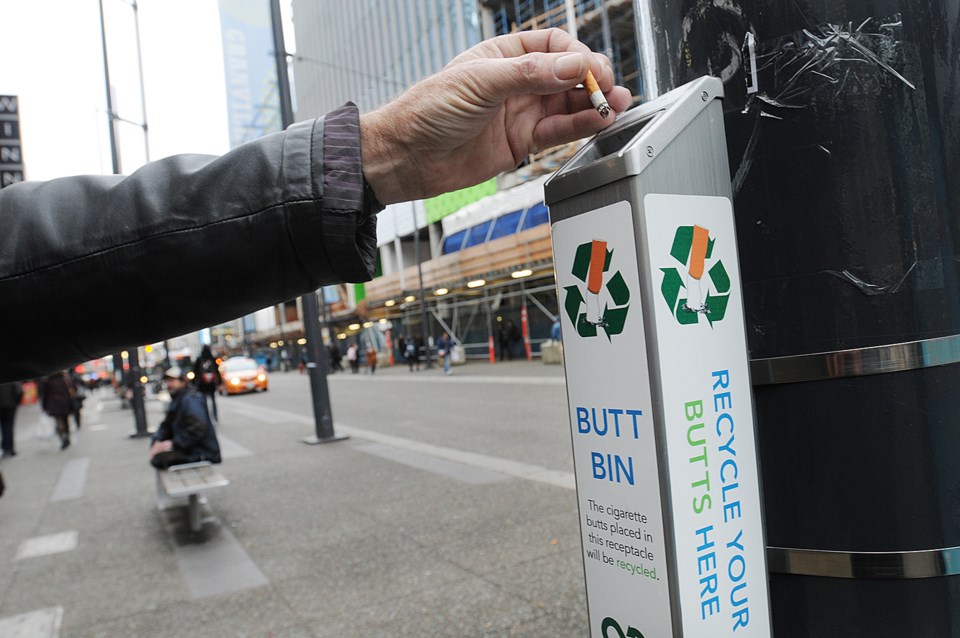The number of smokers continues to decline in British Columbia but there are still enough of them in Vancouver that city council has embraced an innovative program to recycle cigarette butts.
The so-called Cigarette Waste Brigade is a six-month experiment that launched Tuesday at Georgia and Granville where some of the slender, stainless steel receptacles to collect the butts have been attached to power poles.
The hope is that smokers will use the 110 receptacles spread throughout downtown instead of littering sidewalks and streets with butts. The butts, composed of cellulose acetate, will be collected and shipped to a plant in Mississauga, where they will be recycled into plastic pellets that can be used to make plastic pallets and plastic lumber.
The launch of the recycling experiment, which will cost taxpayers a grand total of $110 and create minimum wage jobs for some of the city’s low-income residents, comes during Lung Cancer Awareness Month.
Provincial Health Minister Terry Lake said in a statement Wednesday that smoking is the leading cause of lung cancer, but he noted B.C. has had the lowest “smoking rate” in Canada for the past 14 years and that it continues to decline.
So then, are there enough smokers in Vancouver to make the recycling program worthwhile?
Vision Vancouver Coun. Andrea Reimer, a former smoker, answered that question at the press conference to introduce the program, which will be run by New Jersey-based TerraCycle, which operates the recycling plant in Mississauga.
“I cannot tell you how many times I hear from people about the problem of litter on our streets and, most especially, cigarette butts,” Reimer said. “Whether it’s downtown Vancouver or in our parks or on our beaches, people take pride in our city and they want to see our city and our city streets clean. And this is a new way to make that happen.”
TerraCycle’s contract with the City of Vancouver stems from a meeting Mayor Gregor Robertson had in 2009 with the company’s CEO, Tom Szaky. Company spokesman Albe Zakes wouldn’t disclose the cost to run the six-month experiment but noted the investment is to get a foothold in the market.
While other cities have receptacles that are emptied and taken to a landfill, the company’s experiment in Vancouver to recycle the butts is believed to be the first of its kind in the world.
TerraCycle had no estimates of how many butts will be collected over six months, although the company received about 10 million over the past 18 months from Canadian smokers and anti-litter groups who answered the company’s call to send in their butts.
“So while we don’t have an exact sense of how many we’ll collect, we are confident that we will be able to collect quite a few,” said Zakes, noting a $5 donation will go to United We Can for every pound of butts collected.
United We Can, which operates a recycling depot in the Downtown Eastside, will pay workers at least a minimum wage to collect and package the butts from the receptacles. Another non-profit, Embers, will hire people to maintain the receptacles.
Gerry Martin, general manager of United We Can, said the number of employees that will be hired will depend on the number of butts deposited in the receptacles.
“It will literally depend on the residents of Vancouver,” said Martin, who hoped he would be able to send workers out every day to collect the butts. “The more that these receptacles are filled up, the more jobs that are available.”
Smoker Mike O’Reilly, who used one of the receptacles at Georgia and Granville, said he welcomed a spot to get rid of his cigarette butt. Usually, O’Reilly said, he drops his butt on the ground and stamps it out with his foot.
“It’s a great idea,” said O’Reilly, but noted low-income and homeless smokers who rely on the remnants of a cigarette left on the street will likely be upset with the loss of butts, if the program is successful. “A lot of them will have to quit.”
mhowell@vancourier.com



